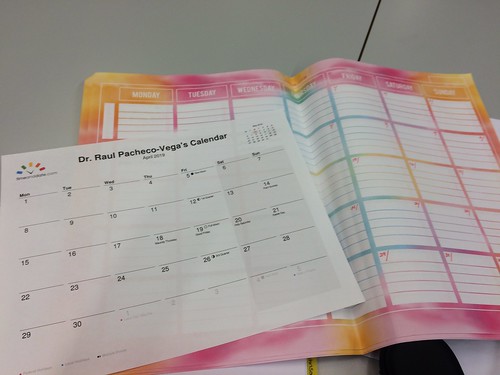I am always honored when fellow scholars mention my name as someone worthy of being followed for advice on planning.
When it comes to questions of how to organize processes, I think @raulpacheco is always a good (the best?) person to ask
— Ingo Rohlfing (@ingorohlfing) December 19, 2019
Sharing this one with grad students in my program – thanks @raulpacheco ! Excellent resource on effective planning, goal setting and time management. #phdadvice https://t.co/bw1SzrWVmK
— Noella Gray (@NoellaJGray) December 17, 2018
I am a very systematic planner and I love having my life neatly organized and planned (I am a Virgo, a Type A and an Upholder).
While I have taken Masters-level project management courses and have read the entire Project Management Institute PMBOK (Project Management Body of Knowledge), I have a very particular set of processes that work for me, and sometimes, work for other folks.
The one question I saw on Twitter today regarding how to do research planning prompted me to curate a list of resources and scholars whose research pipeline processes might be of help for anybody who follows me or reads my blog. Here is my Twitter thread.
First of all, I am NOT the first academic to write about this. Dr. @EllieMackin has an entire page dedicated to Research Planning. https://t.co/unXMqmaf2Z Dr. Mackin has produced these public goods (templates, notes AND YT instructional videos!) for years (thank you Ellie!)
— Dr Raul Pacheco-Vega (@raulpacheco) December 19, 2019
Dr. @rebeccakreitzer kindly showed in a tweet her research pipeline board https://t.co/dllxTXEP59 (and I swear I once heard you say you had your own research board, Mirya @prof_mirya?
By the way, if you’re not in on Dr. Holman’s #MHAWS train, you gotta get yourself on board!
— Dr Raul Pacheco-Vega (@raulpacheco) December 19, 2019
Now, on to my own process. I do NOT use Kanban boards, and that’s something I may change in 2020. I’ll explain why I don’t use the board this way and how I plan to integrate Kanban boards/Research pipeline boards with my current Everything Notebook organizational structure.
— Dr Raul Pacheco-Vega (@raulpacheco) December 19, 2019
My yearly planning post -> https://t.co/oZvQE8XaBc
My only pet-peeve with the board project management strategy is that it requires A LOT (or significant, at least) wall space. I have this on campus (at CIDE), BUT I dont’ at home, so I need to figure out a way to deal with this
— Dr Raul Pacheco-Vega (@raulpacheco) December 19, 2019
I have also suggested that you can break down projects and get them done by using the Granular Planning and Rule of Threes strategyhttps://t.co/kGBrjPnElL
1) break down any project in thirds
2) work on 3 tasks per day
3) budget 3 times as much times as you thought you needed— Dr Raul Pacheco-Vega (@raulpacheco) December 19, 2019
I think you could combine my own planning strategies https://t.co/zGNyGtqJIt with Dr. Lebo’s and Dr. Gotian’s models (plus everyone else whom I’ve mentioned on this thread) quite easily.
Important caveat that zeroes in on something I said at Memorial University of Newfoundland:
— Dr Raul Pacheco-Vega (@raulpacheco) December 19, 2019
While this thread was about project management, I had to discuss something equally important: if you are the principal investigator of a laboratory, or you use the lab model to engage your students and research assistants, you can’t develop your own research pipeline without consulting others. Each member of the team’s research pipeline needs to align with that of the principal investigator, and vice-versa.
The optimal way I see a Gotian/Lebo Kanban Research Pipeline PM model work with students or within a lab is that the PI adopts this project management model, but at the same time, TEACHES their students how their own work fits within the overarching project and lab goals.
— Dr Raul Pacheco-Vega (@raulpacheco) December 19, 2019
By the way, if you are a social sciences or humanities scholar thinking about the “lab model”, I know for a fact that Dr. @amandabittner is testing this idea with her @genpollab (my own lab, @CoReGovLab has worked under this model).
One reason why I follow psychologists.
— Dr Raul Pacheco-Vega (@raulpacheco) December 19, 2019
Most psychologists I follow (@LindaSkitka @Shawpsych @prof_nch among others) use the lab model, so I think this Gotian/Lebo Kanban Research Pipeline model of project management would fit well.
</end thread>
— Dr Raul Pacheco-Vega (@raulpacheco) December 19, 2019
A few respondents offered their own advice on research pipeline management and I link to their responses in my thread.
Another excellent response from Planning Master Extraordinaire herself, Dr. Mirya Holman @prof_mirya (like her, I also innovate with my own processes, all the time) https://t.co/gkkMOvzwHK
— Dr Raul Pacheco-Vega (@raulpacheco) December 20, 2019
Another great thread from @linnealaestad on her own process and how Kanban didn’t work for her https://t.co/xLtCz9xT4I
— Dr Raul Pacheco-Vega (@raulpacheco) December 20, 2019
Overall, I do hope that this thread and blog post will be useful to scholars as they plan their research pipeline! Also grateful to every scholar I quoted here for sharing their processes.


Thank you Dr Pacheco-Vega for these great tips- as usual!
Is there “Project management for academics II”? I love a good sequel 🙂 Best, Rita
Your detailed explanation of combining Kanban boards with the Everything Notebook system is particularly helpful for maintaining organisation and tracking progress. Additionally, the advice on aligning individual research plans with overarching project goals is invaluable for collaborative academic environments. Excellent resource.